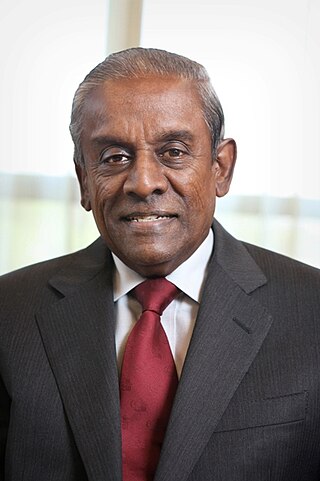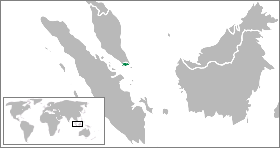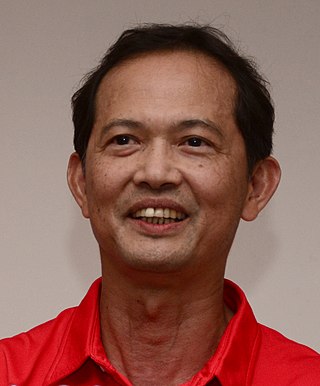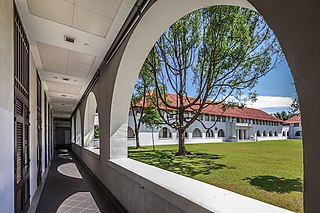
Shunmugam Jayakumar, often known as S. Jayakumar, is a Singaporean former politician, diplomat, lawyer and author who served as Deputy Prime Minister of Singapore between 2004 and 2009. A member of the governing People's Action Party (PAP), he was the Member of Parliament (MP) for Bedok SMC between 1980 and 1988, the Bedok division of Bedok GRC between 1988 and 1997, and later East Coast GRC between 1997 and 2011.

There is a long history of lesbian, gay, bisexual, and transgender activity in Singapore. Male homosexuality was outlawed under British rule, despite being acknowledged among the local population. Following Japanese occupation during World War II and the country gaining independence, homosexuality and transvestism were visible as a street scene, and from the 1970s were catered for in some nightclubs. In that decade also, Singapore became a centre of gender-reassignment surgery.

A Non-constituency Member of Parliament (NCMP) is a member of an opposition political party in Singapore who, according to the Constitution and Parliamentary Elections Act, is declared to have been elected a Member of Parliament (MP) without constituency representation, despite having lost in a general election, by virtue of having been one of the best-performing losers. When less than 12 opposition MPs have been elected, the number of NCMPs is the difference to total 12. NCMPs enjoy all of the privileges of ordinary Members of Parliament, apart from the salary, which is substantially lower.

The Presidential Council for Minority Rights (PCMR) is a non-elected government body in Singapore established in 1970, the main function of which is to scrutinize most of the bills passed by Parliament to ensure that they do not discriminate against any racial or religious community. If the Council feels that any provision in a bill amounts to a differentiating measure, it will report its findings to Parliament and refer the bill back to Parliament for reconsideration. The council also examines subsidiary legislation and statutes in force on 9 January 1970. One member of the PCMR is nominated by the chairman to the Presidential Elections Committee, which is empowered to ensure that candidates for the office of President have the qualifications required by the Constitution. The President also appoints and dismisses the chairman and members of the Presidential Council for Religious Harmony ("PCRH"), established by the Maintenance of Religious Harmony Act, on the advice of the PCMR, and the PCMR is responsible for determining whether PCRH members who are not representatives of major religions in Singapore have distinguished themselves in public service or community relations in Singapore.

The Constitution of the Republic of Singapore is the supreme law of Singapore. A written constitution, the text which took effect on 9 August 1965 is derived from the Constitution of the State of Singapore 1963, provisions of the Federal Constitution of Malaysia made applicable to Singapore by the Republic of Singapore Independence Act 1965, and the Republic of Singapore Independence Act itself. The text of the Constitution is one of the legally binding sources of constitutional law in Singapore, the others being judicial interpretations of the Constitution, and certain other statutes. Non-binding sources are influences on constitutional law such as soft law, constitutional conventions, and public international law.

The National University of Singapore Faculty of Law is Singapore's oldest law school. NUS Law was initially established in 1956 as the Department of Law in the University of Malaya. After its establishment, NUS Law was Singapore's only law school for half a century, until the subsequent establishment of the SMU School of Law in 2007 and the SUSS School of Law in 2017. NUS Law is currently located at the NUS Bukit Timah Campus. The current dean of NUS Law is Andrew Simester. Internationally, NUS Law has been ranked twelfth by the QS World University Rankings by Subject in 2023 and ninth by the Times Higher Education World University Rankings by Subject in 2023.
Tan Cheng Han is a Singaporean lawyer and legal academic. Until 2012, he was the dean of the National University of Singapore Faculty of Law, where he taught contract law and company Law and directed the EW Barker Centre for Law & Business. From 2019 to 2022, he was the dean of the City University of Hong Kong School of Law and the chair professor of commercial law. He was also a consultant at TSMP Law Corporation. In August 2012, he was appointed the inaugural chairman of Singapore's new Media Literacy Council.
Church of Our Saviour or COOS is a church in Queenstown, Singapore, which began as a mission in the 1950s along Alexandra Road and has since grown into a megachurch with a weekly attendance of approximately 4,500. While it is a parish within the mainline Anglican church, COOS is known for its contemporary worship services and charismatic practices like speaking in tongues, faith healing and deliverance.
Janadas Devan is a former journalist, and is the current Chief of Government Communications at the Ministry of Communications and Information of Singapore coordinates the government's public communications. He is also a director at the public policy think-tank Institute of Policy Studies (IPS). Janadas was formerly a senior editor of The Straits Times, the flagship English-language daily newspaper of Singapore Press Holdings. He is the son of C.V. Devan Nair, the third President of Singapore. Devan studied at the National University of Singapore and Cornell University in New York. He is married to literary scholar Geraldine Heng.

Article 15 of the Constitution of the Republic of Singapore guarantees freedom of religion in Singapore. Specifically, Article 15(1) states: "Every person has the right to profess and practise his religion and to propagate it."

Simon Chesterman is an Australian legal academic and writer who is currently vice-provost at the National University of Singapore (NUS) and dean of the NUS's Faculty of Law and NUS College. He is also a senior director for AI Governance at AI Singapore, editor of the Asian Journal of International Law and co-president of the Law Schools Global League.

The right to vote in Singapore is not explicitly stated in Singapore's Constitution, but the Government has expressed the view that it may be inferred from the fact that Singapore is a representative democracy and from specific constitutional provisions, including Articles 65 and 66 which set out requirements for the prorogation and dissolution of Parliament and the holding of general elections. Speaking on the matter in Parliament in 2009, the Minister for Law, K. Shanmugam, said that the right to vote could not be a mere privilege as this would imply the existence of an institution superior to the body of citizens that is empowered to grant such a privilege, but that no such institution exists in a free country. In 1966 a Constitutional Commission chaired by Chief Justice Wee Chong Jin advocated entrenching the right to vote within the Constitution, but this was not taken up by the Parliament of the day. When this proposal was repeated during the 2009 parliamentary debate, the Government took the view that such entrenchment was unnecessary.
Singapore has a multi-party parliamentary system of representative democracy in which the President of Singapore is the head of state and the Prime Minister of Singapore is the head of government. Executive power is vested in the President and the Cabinet. Cabinet has the general direction and control of the government and is collectively responsible to the Parliament. There are three separate branches of government: the legislature, executive and judiciary.

Chan Hiang Leng Colin v. Public Prosecutor is a 1994 judgment of the High Court of Singapore delivered by Chief Justice Yong Pung How which held that orders issued by the Government deregistering the Singapore Congregation of Jehovah's Witnesses under the Societies Act and banning works published by the Watch Tower Bible and Tract Society ("WTBTS") under the Undesirable Publications Act did not violate the right to freedom of religion guaranteed by Article 15(1) of the Constitution of Singapore.

The Speakers' Corner in Singapore is an area located within Hong Lim Park at the Downtown Core district, whereby Singaporeans may demonstrate, hold exhibitions and performances, as well as being able to engage freely in political open-air public speeches, debates and discussions. It is based upon the premise of its namesake, Speakers' Corner, which was first launched at Hyde Park, London and has since been established in many other countries with a political system of representative democracy.
The Separation of powers in Singapore is governed by Constitution of the Republic of Singapore, which splits the power to govern the country between three branches of government – the parliament, which makes laws; the executive, which executes them; and the judiciary, which enforces them. Each branch, while wielding legitimate power and being protected from external influences, is subject to a system of checks and balances by the other branches to prevent abuse of power. This Westminster constitutional model was inherited from the British during Singapore's colonial years.
Lionel Astor "Lee" Sheridan is a former educator and academic who served as the first Dean of the Faculty of Law at the University of Malaya, and its successor universities, in Singapore. He has been considered the "Father of Legal Education in Malaya".
Thio Shen YiSC is a Singaporean lawyer who is a managing partner of the TSMP Law Corporation, alongside his wife Stefanie Yuen-Thio.
Thio Su Mien is a Singaporean former legal academic and lawyer. She was the dean of the National University of Singapore's Faculty of Law from 1968 to 1971.
The TSMP Law Corporation is a law firm in Singapore.











